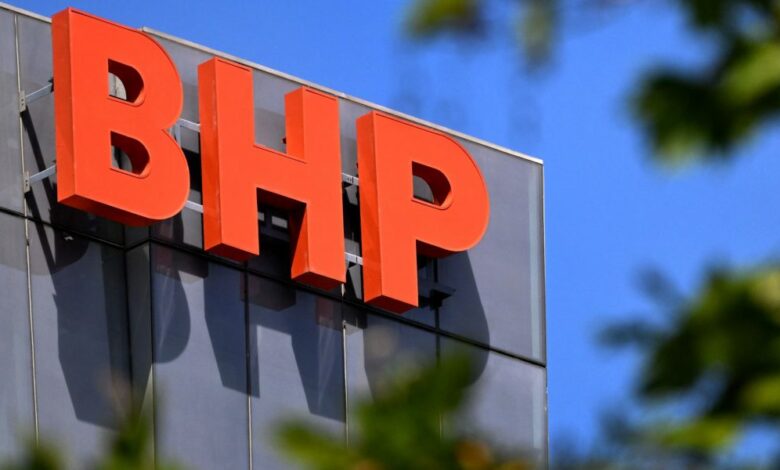Cheap Indonesian nickel, key for EVs, helps sink BHP’s net income by 86%


BHP Group Ltd.’s first-half net income slumped 86% from the year before, after oversupply in the nickel market forced the world’s biggest miner to write down the value of key assets.
The company announced last week it would take a $2.5 billion impairment on the value of its Australian nickel assets, which could be mothballed later this year following a review.
Global supplies of the metal—which has become key to the energy transition due to its use in electrification and batteries—ballooned after Indonesia quickly ramped up production, causing benchmark prices to crater and the closure of at least six nickel projects in Australia in the past year.
“There’s going to be a multi-year period of over-supply in nickel” that could last until the end of this decade, Chief Executive Officer Mike Henry said in a Bloomberg Television interview Tuesday after BHP announced its results. “The consideration that we need to give to nickel is what we do with our business in the intervening period, given that it’s currently loss-making and it has been for some time.”
The company reported that underlying attributable profit from continuing operations in the six months to Dec. 31 was steady at $6.57 billion, slightly below the estimate from analysts. Still, it was the massive slump in net income that was the biggest focus for investors, along with the cut in its interim dividend to 72 cents a share, down from 90 cents in the previous six months.
BHP’s Sydney-based shares fell as much as 1% on Tuesday before trading down 0.2% to A$45.97 at 12:51 p.m. local time.
See-sawing demand for commodities in recent years has whiplashed BHP’s earnings, a trend that started during the pandemic and has continued due to the deteriorating outlook for China’s economy and particularly its metals-intensive construction and property sectors. Last year, just 12 months after posting its highest-ever profit as prices soared, the company reported its lowest annual profit in three years.
BHP said Tuesday all its assets were on track to meet full-year output and cost targets, with demand from top customer China “healthy” despite weakness in its housing sector. The six-month reporting period “had its challenges,” it said in a statement, referring to its nickel assets, which “offset an otherwise solid operation performance and overall healthy commodity prices.”
In a move aimed at supporting its flailing domestic industry, Australia last week added nickel to its Critical Minerals List, which will allow miners and downstream stakeholders of the metal to access the A$6 billion ($3.9 billion) available via the Critical Minerals Facility—a government fund aimed at ensuring Australia is at the forefront of the green metals transition.
Prime Minister Anthony Albanese said in an interview on Monday that his government was looking at “how we can provide further support with a smart, targeted and time-limited policy” for the nickel sector.
Still, BHP’s Henry said Tuesday that federal tax credits and royalty relief at state level may not be enough to stop it shutting down its Nickel West operations, which haven’t been profitable since 2018.
“Given the current nickel price uncertainty, a large capital outlay is hard for BHP to justify” and avoid putting its Australian nickel assets on care and maintenance, RBC Capital Markets analyst Kaan Peker said in answer to emailed questions. The company will be looking for “additional government incentives associated with building downstream processing infrastructure associated in nickel, which the Australian government now deems to be a critical mineral,” he added.
Beyond nickel, iron ore remains the company’s most important revenue earner. Prices of the steelmaking material surged 28% over the reporting period and remain historically high, and that has prompted major producers including BHP to consider development of once-stranded deposits.
BHP and its investors will also be watching whether China’s once insatiable demand for metals can be revived.The nation’s construction sector is expected to ramp up next month, and there will be a focus on whether Beijing will inject further fiscal stimulus to effectively counter steep declines from the crash in the metals-intensive housing market.
“In the near term, the economic outlook for the developed world is expected to improve modestly after a difficult year for both steel and non-ferrous metals demand,” BHP said in the statement. “China and India are expected to remain relative sources of stability for commodity demand.”
The company also said last week it would nearly double the provision set aside to cover damages from the 2015 Samarco dam failure in Brazil to $6.5 billion.
Source link




